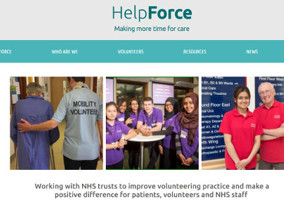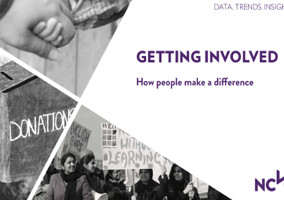A new organisation, HelpForce, has been created to double the number of volunteers in hospitals. Catherine Johnstone, chief executive of Royal Voluntary Service talks about the urgent need to maximise the use of volunteers in hospitals.
Royal Voluntary Service is in its 79th year of providing the gift of voluntary service in support of our National Health Service. With a variety of roles, from patient transport; Home from Hospital support; Ward Trolley services; and an extensive range of cafes, tea bars and shops we are particularly focused on supporting people as they age to stay active and independent.
Joining Royal Voluntary Service in August this year I have visited a range of our frontline services and have seen the significant difference they make to patients, staff, families and friends.
Moreover, I am proud to lead an organisiation that is supported by an army of 25,000 volunteers of which 5,000 are providing regular support to our hospitals across Great Britain on a daily basis. Research has told us for many years that volunteering is good for you. It keeps you connected to your community; offers additional networks that can reduce or prevent loneliness and social isolation and keeps you physically active. It can also give you a real sense of pride and purpose and is increasingly beneficial as you get older when, through no fault of your own, your world can begin to shrink.
During these visits, I have also seen the huge opportunities for my organisation and others to do more through the gift of voluntary service. Whether this be expanding the existing services such as patient transport or exploring new ways of relieving some of the pressures in busy hospitals, I firmly believe that volunteers can support the NHS to have more time to care.
HelpForce is a practical solution to a growing problem, and Royal Voluntary Service is delighted to be a key part of it. Few of us will need convincing of the benefits that volunteers can bring, but there is a growing recognition within the NHS of the need to bring together staff and volunteer teams on a more strategic basis.
Now, for the first time, we have an opportunity to make this happen. Working in an integrated team of NHS Trusts, volunteer involving organisations, Unions, Professional Bodies and NHS England, HelpForce can extend proven practices and test new initiatives. We can measure the impact and pinpoint what works within the hospital environment.
With the overarching aim of supporting older people who are in hospital to return to their communities and avoid readmission, HelpForce will be exploring the support that volunteers can provide to patients and their carers to aid their recovery. A good example could be where healthcare teams know only too well that lack of mobility causes patients to lose muscle strength, have a higher risk of infection and ultimately have a longer stay in hospital – yet for practical reasons, many patients are confined to bed and unable to mobilise frequently within the ward environment.
In the community, Royal Voluntary Service runs a successful partnership with Move It or Lose it, where our trained volunteers help people to rebuild their physical strength through simple exercises to strengthen their muscles in support of them remaining at home. Bringing these services into the hospital environment on either a one to one basis or through a small group approach, could support the healthcare teams and the patient with earlier discharge from hospital. This independent contact with a charity can then be continued into the community after they are home. Helping to build their confidence and to be there to help with the practicalities of returning home from a stint in hospital.
'Not about replacing staff roles'
There are many examples in society where volunteering successfully fits into structured roles, and HelpForce will be working with NHS Trusts to consider where volunteers can provide greatest value. This is not about replacing NHS staff roles but is about providing extra time for care and support, particularly for people without their own network of family and friends.
Discharge from hospital is often complex and daunting for older or vulnerable people. Royal Voluntary Service has seen the benefits of using trained volunteer teams to ensure individuals return home with the right prescriptions, groceries and people who are happy to help them get settled. Several of the HelpForce pilot interventions will focus on discharge and we will be working closely with them.
Our NHS is envied across the world and with the continued developments in medicine that are helping us to live longer, it is of no surprise that there are constantly new pressures for the professionals who work within our hospitals. Therefore as a society we need to find new ways to support our NHS and like all the best initiatives, HelpForce is an exciting combination of common sense and extraordinary potential.
Catherine Johnstone is chief executive of the Royal Voluntary Service.
Related articles












